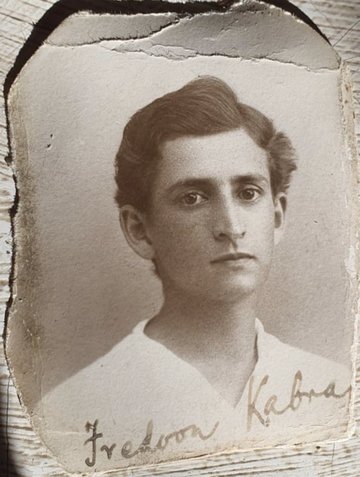
Fredoon Kabraji
‐
Poet and writer
Place of birth
Date of time spent in Britain
mid-1920s – at least the 1950s
About
Fredoon Kabraji was the son of Jehangir Kabraji, an Indian civil servant, and Putlibai. It is unclear exactly when he first came to Britain, but a brief autobiographical note in his edited collection of Indian poetry in English, This Strange Adventure, tells us that he studied journalism at the University of London, which suggests he probably arrived in the mid-1920s. Further, a website which includes information about the genealogy of the Kabraji family states that he married Eleanor M. Wilkinson in Britain in 1926. In his autobiographical note, Kabraji represents himself as a drifter, trying his hand at art, journalism and poetry, after losing interest in the farming career that his parents had chosen for him, and failing to complete a degree. He also writes that 'he grew up to adore England and everything English'.
As well as being a poet in his own right (he had two volumes of poems published by Fortune Press), Kabraji was a book reviewer, contributing to the magazines Life and Letters and the New Statesman, among others, as well as the editor of the above volume of poetry, published by the New India Publishing Co. in 1947.
Mulk Raj Anand, Walter de la Mare, Nagendranath Gangulee, L. P. Hartley, Henry Reed, Iqbal Singh, Rabindranath Tagore, M. J. Tambimuttu.
Fortune Press
A Minor Georgian's Swan Song (London: Fortune Press, 1944)
(ed.) This Strange Adventure: An Anthology of Poems in English by Indians, 1828–1946 (London: New India Publishing Co., 1947)
The Cold Flame: Poems (1922–1924, 1935–1938, 1946–1953) (London: Fortune Press, 1956)
King, Bruce, 'The End of Imperial England, 1948–1969', in The Oxford English Literary History, vol. 13, 1948–2000, The Internationalization of English Literature (Oxford: Oxford University Press, 2004), pp. 13–72
On the subject of Indian genius the position with regard to poetry in English is that it is the misfortune of English that absolutely the best Indian works remain untranslatable or poorly translated. The case of Tagore is signal. With his versatility this creative wizard succeeded in writing his name across two hemispheres in two languages. But he knew himself that in the end English and England could after all absorb him in limited doses only: Bengal could go on absorbing him and being nourished on him to delighted health. With less than genius and somewhat more than mediocrity, we came into the scope of this anthology. With Toru Dutt, Romesh Chunder Dutt, Manmohan and Aurobindo Ghose, Mrs. Naidu and the contemporaries, we reach its peak. These writers have used the English language as to the manner and the matter born. And out of this small company Manmohan Ghose, Mary Erulkar, Bharati Sarabhai, and Tambimuttu distinguish themselves by more than their faultless command of the foreign tongue – by their pliant control of it as a sentient, responsive and delicate creative instrument.
'Introduction', in Fredoon Kabraji (ed.) This Strange Adventure: An Anthology of Poems in English by Indians, 1826–1946 (London: New India Publishing Co., 1947), pp. 6–7
Image credit
Fredoon Kabraji by his father, 1918
Public domain, via Wikimedia Commons
